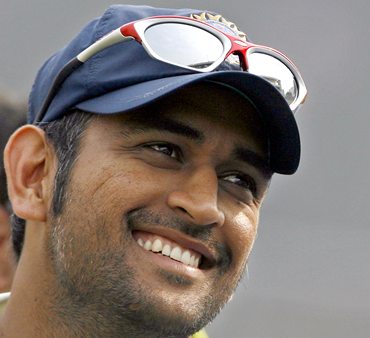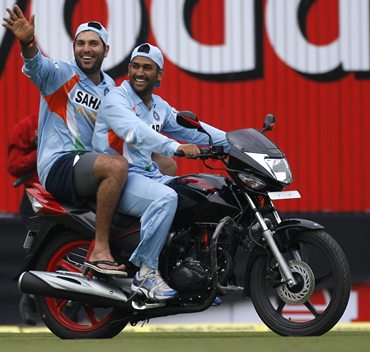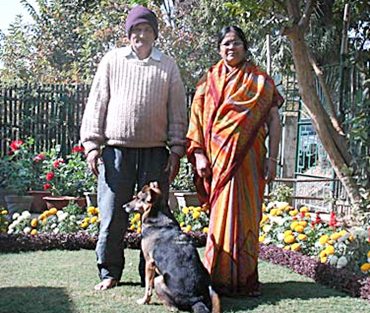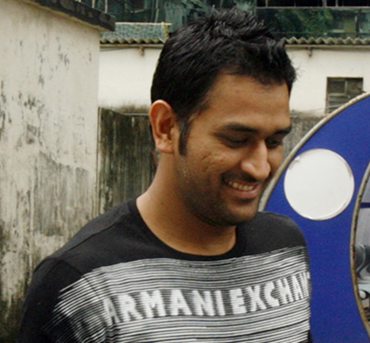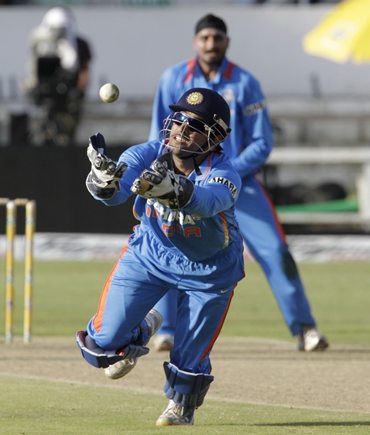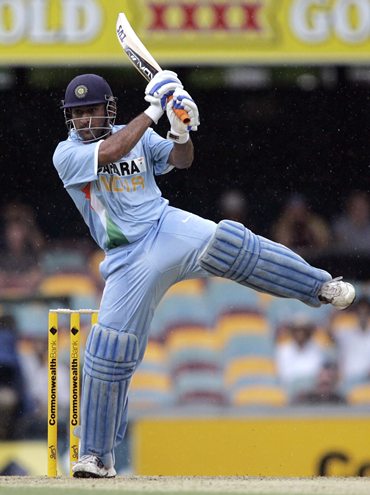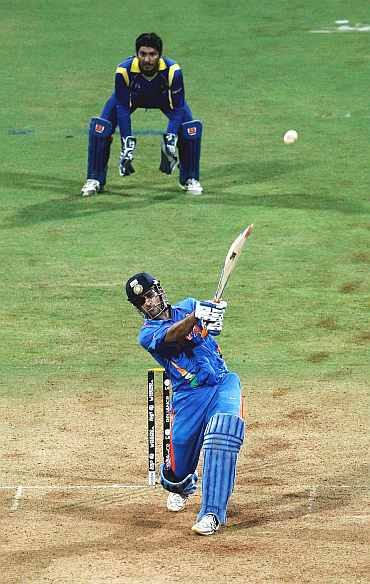 | « Back to article | Print this article |
Leading the team at Lord's a special honour: Dhoni
Stepping on the hallowed turf of the 'Home of Cricket' is an honour for any cricketer, and India captain Mahendra Singh Dhoni is no exception as he prepares to lead his bunch of world beaters in the first Test at the Lord's on Thursday.
Dhoni says the privilege of leading his team out against England on Thursday will rank with anything he has achieved in his glorious career.
"It's obviously big, leading 15 people who have the expectation of 1.2 billion," Dhoni told the Daily Telegraph.
"It's an honour, it's very special. But at the same time it's an added responsibility. You want the Indian team to win each and every game, which is not possible. Still, that's what you are expected to do."
'I have not spent much time with my family'
'Captain Cool', in an interview, spoke about how, at times, he feels like moving far away from the madding crowd on one of his 25 motorbikes.
"If I get the chance," he says, "somewhere in Delhi or Mumbai, I will take my bike out, take the helmet with me and go around for a ride."
The family man in him comes out once he starts talking about home.
"Since 2005, I have not spent much time with my family," he said, thinking back to the year of his Test debut against Sri Lanka.
"In fact, I have spent more time at the Taj Lands End in Mumbai. It was my 100th visit recently, which means I have spent more than 400 days in that hotel, and that is a lot more than I have spent with my family."
'I miss my parents'
Talking about his parents, Dhoni got a touch emotional.
"I feel awful as I am talking right now, because I miss my parents. But at the same time I know I will have fair amount of time with my parents once I finish cricket, after these two, or three, or four years whatever it is.
"My wife tells me when I am not around at the house, 80 per cent of the conversation is about me. But I told my dad, this is the time when I am doing something for the country, and the country comes first. I feel he really understands that."
'I was quite famous in Ranchi from quite early'
He also spoke about how he first came into the limelight.
"It was a 35-over game, the school league final," he said. "I scored 213, and hit seven or eight sixes, and those were big sixes, I was quite famous in Ranchi from quite early."
When he started off, the Indian cricket industry wasn't a billion dollar one so people were circumspect about his choice of profession.
"In those days," he recalls, "people would say, 'OK you play cricket but what do you do in life?"
'Things just fell into place for me'
So he took a job as a railway ticket collector in Kharagpur, a town in West Bengal.
"I played for Central Coalfields Limited and for Indian Airways," he said.
"Those were the years when I improved myself, playing on turf pitches which are rare in India. Today, though, competition is tough in the business world, and it has become a luxury to support young sportsmen."
He was modest enough to admit that things fell in place for him.
"Things just fell into place for me. India were looking for a wicketkeeper, and even though I was unorthodox and didn't have a great technique, my friends said, 'You can hit the ball, you're ideally suited for one-day internationals'."
'When I came in, I was more of a slogger'
People talk a lot about his change of approach in batting and Dhoni justifies that.
"When I came in, I was more of a slogger, trying to hit every ball, irrespective of the format. But then I used to bat at No 3, so you've got five really good players backing you up if you don't score. Now, I'm batting No 6 or No 7 in the one-day internationals, so I've only got bowlers behind me, or maybe one good batsmen.
"People say, 'Why are you not hitting those big sixes?' Often I joke that I'm getting old and I don't have the strength. But time has changed. Now it's all about the requirement of the game; if the situation doesn't require me to hit sixes, why should I? It's the singles and doubles which really excite me now."
'Six off Kulasekara was instinct'
Ask him about the six off Nuwan Kulasekara that gave India the World Cup, he replied, "It was instinct rather than a plan."
He further explained, "But I did say to myself if it is in the right area, I will go for the big shot.
"I hadn't flowed during the Cup, but form is something that goes in one or two innings and comes back in five to 15 deliveries.
"It's the state of mind that is important. I'm glad I promoted myself, because it gave me the chance to do something special for the country."
